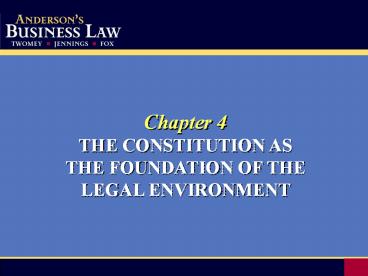Anderson 19th Ed. 2005 - PowerPoint PPT Presentation
1 / 10
Title:
Anderson 19th Ed. 2005
Description:
In the bedrock view, the purpose of a constitution is to ... In the living-document view, a constitution states goals and is intended to change with time. ... – PowerPoint PPT presentation
Number of Views:45
Avg rating:3.0/5.0
Title: Anderson 19th Ed. 2005
1
Chapter 4THE CONSTITUTION AS THE FOUNDATION OF
THE LEGAL ENVIRONMENT
2
The U.S. Constitution and the Federal System
- The U.S. Constitution created the structure of
our national government and gave it certain
powers. - It also placed limitations on those powers.
- It created a federal system with a tripartite
(3-part) division of government and a bicameral
(2-house) national legislature.
3
Federal Government
JUDICIAL BRANCH Courts
EXECUTIVE BRANCH President
4
U.S. Constitution and the States
- Constitutional Powers powers are possessed
exclusively by the federal government. - Delegated Powers given by states to the national
government. - Shared Powers delegated by states to national
but shared with states. - Federal Supremacy.
- Express federal regulation.
- Silence of Congress.
5
U.S. Constitution and the States
Delegation of Powers
U.S. Constitution, which reserves some powers for
the States, delegates some powers to the Federal
government, and allows some powers to be shared,
or exercised by both.
6
Interpreting and Amending the Constitution
- Conflicting Theories
- In the bedrock view, the purpose of a
constitution is to state certain set principles. - In the living-document view, a constitution
states goals and is intended to change with time. - In recent years the use of the living-document
interpretation has expanded the powers of the
federal government.
7
Amending the U.S. Constitution
The Constitution has been amended, or changed in
three ways
By Practice In a few cases, the actions of
government have established accepted practices
which depart from the requirements of the
Constitution.
Judicial Interpretation The U.S. Supreme Court
has been called upon to apply the Constitution to
many new situations, unforeseen to the documents
original writers.
Formal Amendment - Only 27 formal amendments to
the Constitution have been completed, though
thousands have been proposed.
Article V of the U.S. Constitution specifies the
procedure for adopting amendments.
8
Federal Powers
- Commerce Clause Powers.
- Became general welfare power (the affectation
doctrine). - Commerce clause today.
- Commerce power limits power of states.
- Financial Powers.
- Tax, borrow, spend, and coin money.
9
Federal Powers
Constitutional Limitations on Government
- Among the limitations on government that are most
important to business are the requirements of - Due Process.
- Substantive vs. Procedural.
- Equal Protection of the law.
- Reasonable Classification.
10
The Bill of Rights and Business
- First Ten Amendments provide protection for
individuals and corporations. - Businesses enjoy free speech protections under
the First Amendment. - Commercial Speech (advertising).































